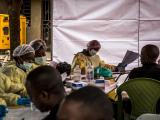Jul 19, 2003 (CIDRAP News) Six months after President Bush proposed the idea, the US House this week overwhelmingly passed "Project Bioshield," a plan to promote the development of drugs and vaccines needed to defend the nation against attacks with biological and other unconventional weapons.
The Project Bioshield Act of 2003, approved Jul 16 in a 421-2 vote, would authorize almost $5.6 billion over the next 10 years to pay for development of vaccines, drugs, and other biomedical "countermeasures" for biological, chemical, nuclear, and radiological weapons. The sum includes $890 million for fiscal year 2004. Supporters of the bill said government financing of such countermeasures is necessary because there is little or no commercial market for them.
The bill also would empower the secretary of health and human services to authorize the use of drugs and vaccines not licensed by the Food and Drug Administration in the event of bioterrorist attacks or other public health emergencies.
President Bush originally proposed Project Bioshield as a $6 billion program in his State of the Union speech last January. He specifically cited the need for vaccines and treatments for anthrax, botulism, Ebola, and plague.
Rep. Tom Davis, R-Va., in a statement hailing passage of the bill, called it "a cornerstone of the administration's strategy to prepare our nation against the possibility of a bioterrorist attack." Davis is chair of the Government Reform Committee, one of three House committees that worked on the bill.
"Unfortunately, there has been little progress in treatments for . . . deadly diseases like smallpox, Ebola and plague, which affect few if any Americans," Davis said. "The reality is there is little manufacturer interest in developing necessary treatments for these diseases because no significant commercial market exists outside the government. . . . Should the United States be attacked with these deadly pathogens, however, the need for vaccines, tests, and treatments would be great and immediate."
The bill stipulates that up to $3.4 billion of the total $5.6 billion authorization can be used in fiscal years 2004 through 2008. The money is intended exclusively for research, development, and stockpiling of drugs, vaccines, and other biomedical products, an aide to the House Energy and Commerce Committee, which also worked on the bill, told CIDRAP News.
The Senate has not yet acted on the Bioshield proposal. The Senate Health, Education, Labor and Pensions Committee approved a version of the plan in March, but Sen. Robert Byrd, D-W.Va., has prevented a vote in the full Senate, according to a Reuters report this week. The report said Byrd contends that the bill's funding provisions should not be allowed to bypass the Appropriations Committee, on which he is the ranking Democrat.
Davis's statement said the House bill would enable the HHS secretary to use "simplified acquisition procedures," such as noncompetitive procedures, to promote development of needed drugs and vaccines and to procure them. "The secretary would also have expedited authorities to award research grants and to hire technical experts and consultants," Davis said. Amendments added by the Government Reform Committee specify that the streamlined procedures can be used only when the HHS secretary determines that there is a "pressing need for the procurement of a specific countermeasure," he added.
The legislation entrusts decisions about research and development contracts to the HHS secretary, but companies will have a "limited right" to appeal those decisions to the General Accounting Office, Davis said. "Appeals could not be used to stall the research and development procurement process."
The bill provides that HHS can authorize the use of non-FDA-approved biomedical products in emergencies if the totality of scientific evidence indicates that the benefits of a product outweigh its risks. Healthcare personnel who administer such products and patients who are treated with them must be fully informed of the benefits, risks, and alternatives, the legislation states.
HHS Secretary Tommy Thompson applauded the House passage of the bill in a statement yesterday. "We need to improve the medications and vaccines available to combat biological weapons," he said. "By bringing researchers, medical experts and the biomedical industry together, our nation can achieve the breakthroughs in bioweapons protection that we need to keep our families safe."
See also:
Full text of bill and other information on the Library of Congress's Thomas Web site (in the "bill number" field, search "HR 2122")
http://thomas.loc.gov/



















